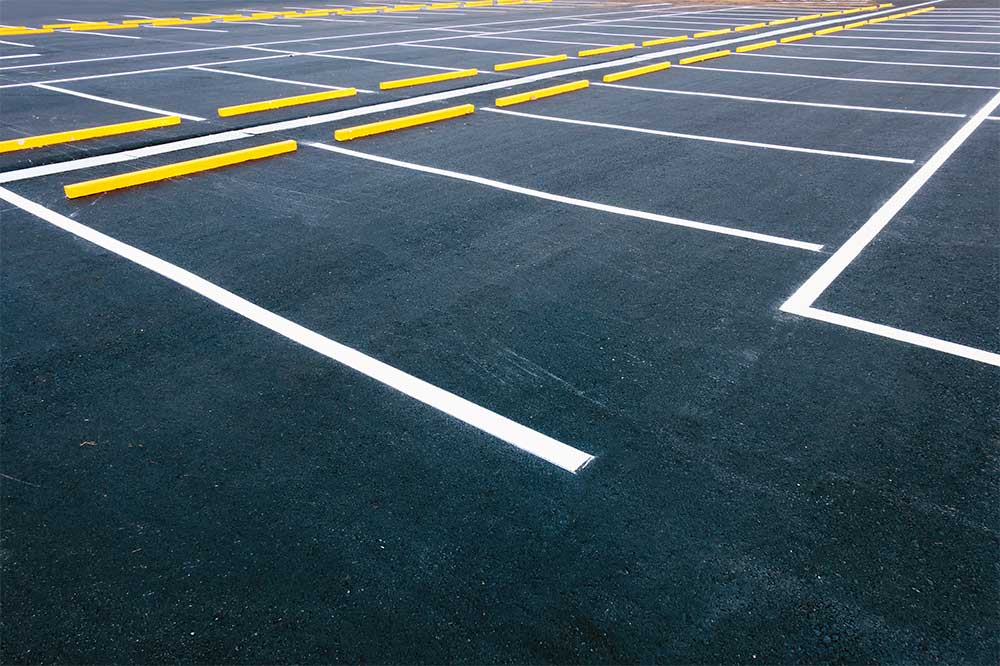Industrial Parking Lot Paving: Changing Areas with Hot Mix Asphalt
Industrial Parking Lot Paving: Changing Areas with Hot Mix Asphalt
Blog Article
Discovering the Environmental Benefits of Hot Mix Asphalt
The use of Hot Mix Asphalt in infrastructure projects offers an engaging situation for sustainable advancement and environmental stewardship. By delving into the detailed information of its manufacturing procedures and the cutting-edge usage of recycled products, a much deeper understanding arises of just how this modern technology exceeds mere surface applications. The environmental benefits of Warm Mix Asphalt expand far beyond preliminary impacts, offering a nuanced point of view on how this material can lead the way for a greener future.

Lowered Greenhouse Gas Emissions
Warm Mix Asphalt production supplies a substantial decrease in greenhouse gas discharges contrasted to other pavement materials. The manufacturing process of Hot Mix Asphalt includes heating the mixture of aggregate and asphalt binder to high temperature levels. This procedure needs much less power compared to the manufacturing of alternative sidewalk materials, causing lower greenhouse gas discharges. Furthermore, the use of recycled materials in Hot Mix Asphalt better adds to decreasing its environmental impact. By including reclaimed asphalt pavement and recycled asphalt tiles right into the mix, the requirement for virgin products is lowered, causing power cost savings and decreased discharges related to removal and handling.
Researches have actually shown that Warm Mix Asphalt sidewalks have a smaller carbon footprint over their life process compared to other sidewalk choices. The toughness and recyclability of Warm Mix Asphalt further enhance its environmental advantages by lowering the requirement for constant maintenance or replacement, therefore conserving sources and reducing discharges connected with reconstruction activities.
Energy Effectiveness and Conservation
The production process of Warm Mix Asphalt not only reduces greenhouse gas exhausts but additionally contributes significantly to power performance and preservation initiatives. Power effectiveness is an essential benefit of Hot Mix Asphalt production compared to various other pavement kinds. The procedure includes heating the products at heats to produce the asphalt mix, which calls for less energy than alternative methods. Additionally, the capability to reuse and recycle asphalt sidewalk further improves energy preservation. By incorporating redeemed asphalt pavement (RAP) into brand-new blends, the market conserves energy that would have been required to generate entirely brand-new materials. The sturdiness of Warm Mix Asphalt reduces the frequency of maintenance and repair, leading to lasting power savings. This durability decreases the energy-intensive processes included in regular fixings and substitutes. Overall, Hot Mix Asphalt sticks out as an eco-friendly option that prioritizes energy effectiveness and preservation throughout its lifecycle.
Lasting Pavement Solutions

One secret element of lasting sidewalk solutions is making use of recycled products such as redeemed asphalt sidewalk (RAP) and recycled asphalt tiles (RAS) By including these products right into the asphalt mixes, the demand for virgin resources is minimized, bring about reduced power usage and greenhouse gas exhausts throughout manufacturing. In addition, the reuse of these products assists divert waste from landfills, contributing to a much more sustainable and round economy.
Moreover, lasting sidewalk options focus on enhancing pavement layout to boost performance and longevity. Techniques such as warm mix asphalt this link (WMA) and rock mastic asphalt (SMA) enhance the longevity and strength of sidewalks, lowering the demand for regular repair work and replacements. By recommended you read implementing these cutting-edge strategies, infrastructure developers can develop pavements that not only fulfill high-performance requirements but likewise reduce their environmental impact.
Minimized Environmental Effect
Hot mix asphalt, in specific, offers a number of advantages that contribute to minimizing the overall environmental impact of roadway facilities. One vital element is the recyclability of asphalt, which can be recycled numerous times without endangering its high quality - Regrading.
In addition, the production of hot mix asphalt releases reduced levels of greenhouse gases compared to other pavement products, making it an extra environmentally pleasant alternative. The energy performance of asphalt plants has also enhanced throughout the years, resulting in minimized gas consumption and lower discharges. Furthermore, the smooth surface area of warm mix asphalt reduces rolling resistance for cars, leading to lower fuel usage and lowered air contamination from lorry emissions.
Contribution to Climate Change Mitigation
Hot mix asphalt plays an important function in mitigating environment modification with its sustainable properties and reduced environmental impact. One significant payment to environment adjustment reduction originates from the power effectiveness of hot mix asphalt production. Compared to other sidewalk alternatives, the production procedure for hot mix asphalt consumes less energy and produces lower degrees of greenhouse gases, hence minimizing its general carbon footprint.
Furthermore, hot mix asphalt's ability to mirror sunshine, called albedo, aids in lowering city warmth island results. By lessening heat absorption and retention, warm mix asphalt sidewalks can lower the need for cooling in metropolitan locations, subsequently reducing greenhouse gas emissions associated with power usage for cooling objectives.
Furthermore, the resilience and recyclability of warm mix asphalt better improve its climate adjustment mitigation capabilities. Regrading. The lengthy lifespan of asphalt sidewalks decreases the need for regular repair work or substitutes, eventually decreasing the carbon discharges linked to roadway maintenance tasks. Furthermore, the recyclability of asphalt products minimizes the need for virgin resources and reduces the environmental effect of sidewalk building, aligning with sustainable techniques for climate adjustment mitigation.
Verdict
To conclude, the environmental advantages of Hot Mix Asphalt demonstrate its substantial contribution to lowering greenhouse gas emissions, saving power, and minimizing environmental effect. This lasting pavement service aligns with climate modification reduction initiatives, promotes resource preservation, and boosts infrastructure advancement. By using recycled products, energy-efficient manufacturing processes, and resilient style, Warm Mix Asphalt plays an essential function in promoting an extra eco-friendly method to framework construction.
The production process of Hot Mix Asphalt includes heating up the blend of accumulation and asphalt binder to high temperature levels. By from this source including redeemed asphalt sidewalk and recycled asphalt tiles into the mix, the need for virgin materials is minimized, leading to energy savings and decreased emissions associated with extraction and processing.
One key aspect of sustainable sidewalk remedies is the usage of recycled products such as recovered asphalt sidewalk (RAP) and recycled asphalt roof shingles (RAS) Methods such as warm mix asphalt (WMA) and stone mastic asphalt (SMA) boost the durability and resilience of sidewalks, lowering the demand for constant repair services and replacements. Compared to other sidewalk alternatives, the manufacturing process for hot mix asphalt consumes much less power and releases reduced levels of greenhouse gases, therefore minimizing its total carbon impact.
Report this page